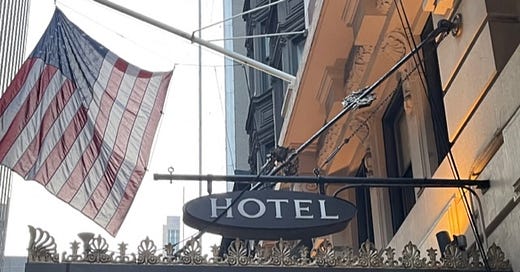I was a fortunate trailing spouse last week on a business trip to New York City. One highlight, lunch at the Algonquin Hotel, prompted fresh thoughts about author Edna Ferber (1885-1968). Ferber was part of the renowned “Algonquin Round Table” in the 1920s, a life she hardly could have imagined during her Ottumwa, Iowa years (1890-1897)*. Just as vicious antisemitism in Ottumwa contributed to Ferber’s personality and perspective, her Round Table years undergirded her development as a writer and literary persona.
My recent Algonquin encounter led to reflections about Ferber’s remarkably productive career, which generated 32 books, including two autobiographies. Following are my take-aways of what made her successful, thoughts in response to a statement in “Edna Ferber’s Hollywood” by J. E. Smyth (2010): “Ferber was, in fact, the top selling woman writer of the twentieth century.”
Importance of family & friends. Ferber provided care and companionship for her mother, Julia, decades after her father’s early death. Devotion to her mother may have contributed to Ferber never marrying, it’s hard to speculate. She had a complex relationship with her only sibling, Fannie, running both hot and cold, despite both women’s attempts to bridge their gaps. As for others seated at the Round Table, informal camaraderie met some of Ferber’s social needs. Given her small family and a writer’s solitary pursuit, Round Table comradeship was important to Ferber. Despite the wisecracks, Round Table friendships provided support for many participants.
Commitment to hard work. Ferber’s sole source of income was her creative production. Her ability to isolate, sit at a typewriter, and knock out a short story, a play, or an epic novel was legendary. The author herself noted she “worked like a horse” and while it wasn’t ditch digging, writing demanded discipline and required confidence that efforts ultimately would be rewarded.
Capturing “real life”. Ferber’s fiction focused on believable characters, often women channeling their talents to navigate challenging situations. Her early career short stories required condensation… guiding readers to the critical moment of resolution. Her novels, frequently spanning generations, required greater complexity and expanded casts, each character granted distinctive qualities. Her fiction was credible because it was drawn from life experiences and conveyed with authenticity.
A toolbox of skills. I cite here two exceptional qualities that characterize my impression of Ferber: her boundless curiosity plus an ability to transform what might be setbacks into advancements. One example: Opening night of a play Ferber wrote was interrupted by bats flying through the audience to the horror of attendees. A colleague commented about making it a road show, perhaps on a boat floating down the river. Ferber responded (in essence), “Wait. Say more…” The book/play/musical “Showboat” was conceived, although obviously, it’s never quite this simple.
A trailblazer. Repeatedly, when encountering new situations, Ferber was sufficiently emboldened to strike out on her own, to keep moving in a forward direction. When there’s no path, make one! For instance, in three serialized Emma McChesney books, the primary character is committed to her career, a traveling saleswoman -- a fictional first. Second example, Ferber’s ability to take a story she’d written from print to stage, then from stage to film, something she accomplished numerous times. Important responsibilities weren’t necessarily delegated to others, although others were certainly involved. Like fictional Emma McChesney, Edna Ferber was a very savvy and successful businesswoman.
Many lessons can be gleaned from Edna Ferber, in her books and in her life. If you haven’t already read Ferber, two suggestions: “So Big” (1924), a Pulitzer Prize winner, and “Giant,” (1952), both available at most public libraries. Ferber’s books generally hold up well, in part because they’re rooted in real life, as the author first experienced it, in Iowa and Wisconsin.
Or, you might just toast the author with her favorite Algonquin beverage, a horse’s-neck cocktail. In which case, CHEERS!
____________________________________________________________________________
*After Ottumwa, Ferber lived in Appleton (WI) and Milwaukee, then Chicago before moving to New York.
*****
I’m pleased be among the many talented writers and artists that constitute the Iowa Writers’ Collaborative:




